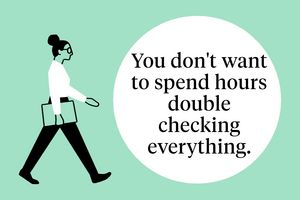Here are some insights from Kellogg professors on how to build a strong career—without letting it take over your life.
“When you’re interviewing for a job, you’re typically in a position of low power,” says Derek Rucker, a professor of marketing. As such, it can be valuable to think about the power dynamics present in such interactions. One concern is that sometimes being lower in a hierarchy can make us feel—and therefore possibly project—weakness. Probably not the impression you’re going for!
But Rucker and his collaborators have begun to explore whether there are ways to mitigate these feelings. In their research, when participants were asked to remember a time when they were powerful, they subsequently appeared more confident and persuasive, both in the letters they wrote when applying for jobs and in practice interviews.
“We think it’s an important step in an effort to better understand power dynamics. Hierarchy is a real part of many everyday business interactions,” Rucker says. “We don’t have enough data to proscribe ‘quick fixes’, but as a starting point it can be useful to take stock of the situation and consider how your place in a hierarchy might affect your psyche and how others react to you.”
That said, you might take a cue from professional athletes and use music to pump yourself up before an interview. “Empowering music might be one potential starting point to get us in the right frame of mind,” Rucker says.
Of course, getting hired is just the beginning. Once you’ve landed a job, it’s best not to wait around for your manager or someone else to take the lead on mapping your career path. You are in control of your fate.
Carter Cast, a professor of innovation and entrepreneurship, offers advice for how to take charge and develop your own potential in his beautifully illustrated “DIY” career guide. Find out why you should keep a journal, select a personal “board of directors,” and write your own report cards. One quick takeaway: “Become an expert. Pick an area that is important to you and your company and go deep with it. When you become sought after for your specific knowledge, your value increases,” says Cast.
As you build your career, you also need to consider its trajectory.
According to Kellogg professor and former dean Sally Blount, the post-college years are a critical time for shaping the arc of a person’s career—especially for women, who tend to have more family responsibilities down the line. Getting it “right” within this decade can pay off in one’s 30s or 40s; getting it “wrong” can have disproportionate costs over the long run.
If your aim is to make it to the c-suite, there are key skills—including a working knowledge of people management, core business functions, organizational culture, and networking—that you will need to begin to develop early in your career, says Blount.
And don’t ignore the set of highly competitive, entry-level jobs that offer some of the most reliable opportunities for acquiring those skills. Blount calls these jobs—which are often in management consulting, banking and finance, blue-chip corporations, and small, fast-growing companies—“career accelerators.”
One smart way to advance your career is to influence those above you.
According to William “Chip” Horn, U.S. Army Chief of Staff Senior Fellow at Kellogg, when you help your manager perform better, your value increases significantly. Plus, you can have a positive impact on your whole organization.
You can “lead up” by offering input from the organization’s perspective (rather than your own).
“Say your boss is the head of marketing,” Horn says. “Instead of telling her, ‘This is what I think we should do from a marketing perspective,’ you can say, ‘Here’s how things look from a whole business approach. Here are some perspectives from sales, production, and HR. If you integrate all of that, here’s what I think we should tell the CEO.’”
Horn also recommends asking your boss probing questions and helping her think through key decisions, as well as nudging the leadership to make decisions that will benefit everyone. Behavioral economists refer to this as being a “choice architect”—subtly, but thoughtfully, framing something in accordance with a desired outcome.
By taking this approach, not only will you help others succeed, but you will also have a chance to demonstrate your own leadership potential.
“Your boss will recognize your proactiveness, initiative, and ability to see the whole picture,” Horn says, “which is a good indicator that you can move into more senior roles over time.”
One of the greatest challenges of building a successful, rewarding career is striking the right balance between your ambition and your relationships.
Professor Neal Roese, a leading expert in the science of regret, has studied the issue closely, and has found that our most intense regrets often have to do with losing touch with close friends.
Our neglected friendships are typically casualties of busy schedules and frequent moves. We usually recognize how important it is to invest in our spouse or partner, but we forget that maintaining close friendships takes effort, too, and that the effort is worth it.
The key is finding ways to make personal connections wherever you are, and preserving the ones you value most, says Roese. After all, we rely on friends to be our critics, cheerleaders, and sounding boards throughout our lives.
One of the simplest ways to preserve friendship is to make a point of keeping those social appointments on your schedule. “As people start getting caught up in work and family life, the first thing to go is the weekly or monthly beer you used to have with your friend,” says Roese. “People in their twenties might not realize how many life forces will push them away from their friends as they get older.”
Face-to-face interaction is crucial. Today, we’re always a text or Facebook photo away from a friend, but social media exchanges are no substitute for the real thing.
“What we see is a longing for a close connection,” Roese says. “That’s what people miss the most.”



